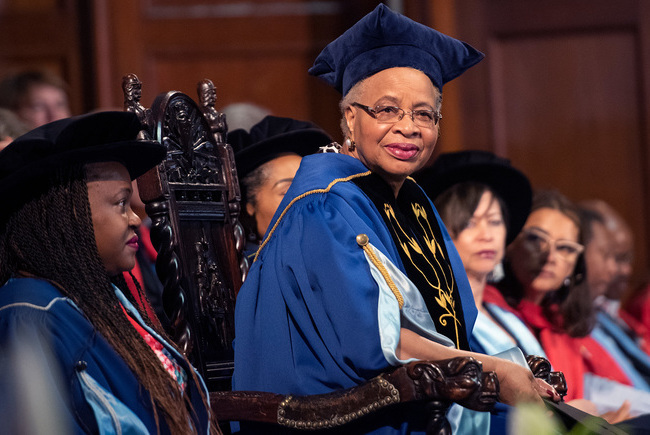UCT in 2019
21 September 2020 Read time 3 min.
Students
71 home languages listed
124 countries represented on campus
7 579 students lived in UCT’s 39 catered or self-catering student residences.
21 693 students lived off campus.
Commerce 6 746
EBE 4 866
Health Sciences 5 093
Humanities 7 398
Law 1 303
Science 3 132
GSB 734
16 699 undergraduates
11 671 postgraduates
902 occasional students
5 630 new first-years
7 320 graduates
29 272 students registered:
23 671 South African students
2 834 SADC students
1 031 students from the rest of Africa
1 598 students from elsewhere in the world
15 668 female
13 584 male
19 transgender
1 unspecified
Staff
4 928 permanent staff members
1 184 academic staff
593 male
591 female
5 assistant lecturers / junior research fellows
320 lecturers
264 senior lecturers
359 associate professors
228 professors
PhDs 739
Master’s 337
901 South African
85 African
198 international
3 744 professional, administrative support and service (PASS) staff
1 443 male
2 301 female
Rankings and ratings
UCT leads in Africa in all of the five major world university rankings:
- Times Higher Education World University Rankings
- Quacquarelli Symonds World University Rankings
- Centre for World University Rankings
- US News Best Global Universities Rankings
- ShanghaiRanking’s Academic Ranking of World Universities
UCT’s massive open online courses (MOOCs) drew 280 000 enrolments from more than 100 countries.
Memorial Hall, previously Jameson Memorial Hall, was renamed the Sarah Baartman Hall to lift her up as a potent symbol of the new campus community we are building.
Women at UCT
All four executive leaders of the academic enterprise at UCT are women, including the vice-chancellor and three deputy vice-chancellors, a rarity in higher education institutions around the world.
Dr Precious Moloi-Motsepe was elected as the university’s sixth chancellor, becoming the second black woman to hold the position. She took over from Mrs Graça Machel, who served the institution from 1999 to 2019.
National Research Foundation
13% of the country’s National Research Foundation (NRF) rated scholars were at UCT.
30% of South Africa’s NRF A-rated researchers called UCT home.
25 km2 – The total size of the UCT campuses.
>1.2 million print volumes and an estimated 54 km of shelf space are available at UCT Libraries.
116 social responsiveness initiatives were in progress, covering development, education, employment, environment, gender, health, inequality and poverty.
Almost 40 different sports codes
The Graduate School of Business (GSB) Conference Centre was completed and achieved a 4-Star Green Star rating from
the Green Building Council of South Africa.
100+ student societies are active on campus, divided into five categories: academic, national/cultural, faith, special interest and political.
15 young academics were part of UCT’s Future Leaders programme, which is aimed at retaining the best talent at UCT and on the continent, and to training the next generation of academic leaders.
*Figures correct at the time of publication
 This work is licensed under a Creative Commons Attribution-NoDerivatives 4.0 International License.
This work is licensed under a Creative Commons Attribution-NoDerivatives 4.0 International License.
Please view the republishing articles page for more information.

Cover image: Spurred on by the death of UCT student Uyinene “Nene” Mrwetyana, UCT staff and students coalesced on Parliament in protest of increasing sexual and gender-based violence in the country.
Year in Review 2019

Graça Machel, Chancellor from 1999 to 2019, writes a message of welcome.
21 Sep 2020 - 2 min read
Q&A with Professor Loretta Feris, Deputy Vice-Chancellor: Transformation
21 Sep 2020 - >10 min read
Q&A with Associate Professor Lis Lange, Deputy Vice-Chancellor: Teaching and Learning
21 Sep 2020 - >10 min read
Previous Editions




The Newsroom and Publications unit releases an annual report, which is a review of activities on campus during the previous year. It spans nearly all aspects of UCT life; and includes reports from senior executives on issues such as governance, teaching and learning, research, social responsiveness, transformation and employment equity. Each year the report illustrates clearly why UCT is held in such high regard in South Africa, Africa and across the globe.
















